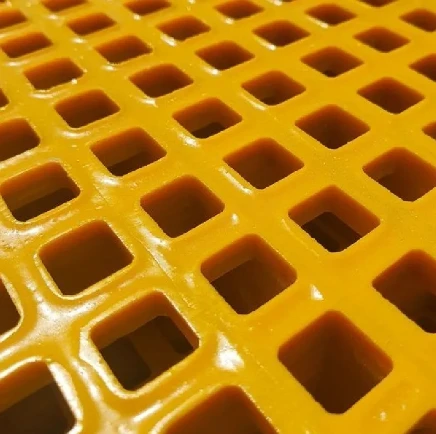loading...
- No. 9, Xingyuan South Street, Dongwaihuan Road, Zaoqiang County, Hengshui, Hebei, China
- admin@zjcomposites.com
- +86 15097380338
- Welcome to visit our website!
Durable Mini Mesh Grating for Enhanced Drainage and Aesthetic Applications
Understanding FRP Mini Mesh Grating A Versatile Solution for Various Applications
Fiber Reinforced Plastic (FRP) mini mesh grating has emerged as an innovative solution tailored for various industrial and commercial applications. Lightweight, durable, and resistant to corrosion, this type of grating provides an effective alternative to traditional materials such as metal or wood. Its unique characteristics make it an ideal choice for settings where strength and resilience are essential.
What is FRP Mini Mesh Grating?
FRP mini mesh grating is a composite material made from a combination of polymer resins and reinforcing fibers, usually glass fibers. This results in a strong yet lightweight product that offers superior structural integrity compared to conventional grating options. The mini mesh design refers to the small openings within the grating, ensuring slip resistance and allowing for effective drainage in environments that may be subject to spills or precipitation.
Key Advantages
1. Corrosion Resistance One of the most significant benefits of FRP mini mesh grating is its resistance to corrosive environments. Unlike metal, which can rust and degrade over time, FRP maintains its integrity even when exposed to chemicals, acids, and harsh weather conditions. This makes it suitable for industries such as wastewater treatment, chemical processing, and marine applications.
2. Lightweight The lightweight nature of FRP mini mesh grating simplifies installation processes, reducing labor costs and time. It is easy to handle, transport, and cut to size, making it a convenient option for project managers and construction crews.
3. Slip Resistance Safety is a top priority in any industrial setting. The mini mesh structure offers excellent slip resistance, minimizing the risk of accidents in areas where spills may occur or where water could collect. The textured surface ensures secure footing for workers, enhancing overall workplace safety.
4. Customizable FRP mini mesh grating can be manufactured in various colors, sizes, and load-bearing capacities, catering to specific project requirements. This customization capability allows designers and engineers to integrate grating that not only performs well but also fits aesthetically within the environment.
5. Durability The lifespan of FRP mini mesh grating far exceeds that of conventional materials. Its resistance to impacts, abrasion, and UV radiation means that it will maintain its functionality and appearance over time, resulting in lower replacement and maintenance costs.
frp mini mesh grating

Applications Across Industries
The versatility of FRP mini mesh grating allows it to be utilized in a wide range of applications. Some common uses include
- Walkways and Platforms Its lightweight and slip-resistant features make it a preferred choice for walkways, catwalks, and platforms in industrial settings.
- Drainage Systems The open structure of mini mesh grating facilitates drainage, making it suitable for use in drainage channels, trenches, and around pools.
- Water Treatment Facilities The corrosion resistance of FRP makes it ideal for environments frequently exposed to corrosive substances, such as water treatment facilities.
- Food Processing Plants Easy to clean and resistant to chemicals, FRP mini mesh grating is often used in food processing applications where sanitation is critical.
- Marine Industries Its ability to withstand saline conditions makes it popular for docks, marinas, and other marine applications.
Conclusion
In summary, FRP mini mesh grating is a robust, lightweight, and customizable solution that offers numerous benefits for various industrial and commercial applications. With its exceptional durability and resistance to corrosion and slip hazards, FRP mini mesh grating is paving the way for enhanced safety and efficiency in diverse work environments. Whether in construction, manufacturing, or specialized industries, this grating proves to be an invaluable asset for modern projects.
-
Transform Your Spaces with FRP Grating SolutionsNewsNov.04,2024
-
The Versatility and Strength of FRP RodsNewsNov.04,2024
-
The Excellence of Fiberglass Water TanksNewsNov.04,2024
-
The Benefits of FRP Grating for Your ProjectsNewsNov.04,2024
-
Elevate Your Efficiency with FRP Pressure VesselsNewsNov.04,2024
-
Welcome to the World of FRP Pressure VesselsNewsOct.12,2024
-
Unveiling the Future of Filtration: Why FRP Filter Vessels are a Game ChangerNewsOct.12,2024
